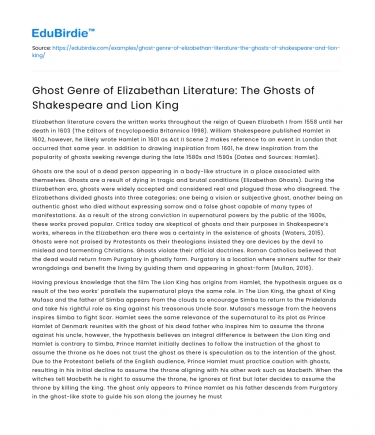Elizabethan literature covers the written works throughout the reign of Queen Elizabeth I from 1558 until her death in 1603 (The Editors of Encyclopaedia Britannica 1998). William Shakespeare published Hamlet in 1602, however, he likely wrote Hamlet in 1601 as Act II Scene 2 makes reference to an event in London that occurred that same year. In addition to drawing inspiration from 1601, he drew inspiration from the popularity of ghosts seeking revenge during the late 1580s and 1590s (Dates and Sources: Hamlet).
Ghosts are the soul of a dead person appearing in a body-like structure in a place associated with themselves. Ghosts are a result of dying in tragic and brutal conditions (Elizabethan Ghosts). During the Elizabethan era, ghosts were widely accepted and considered real and plagued those who disagreed. The Elizabethans divided ghosts into three categories; one being a vision or subjective ghost, another being an authentic ghost who died without expressing sorrow and a false ghost capable of many types of manifestations. As a result of the strong conviction in supernatural powers by the public of the 1600s, these works proved popular. Critics today are skeptical of ghosts and their purposes in Shakespeare’s works, whereas in the Elizabethan era there was a certainty in the existence of ghosts (Waters, 2015). Ghosts were not praised by Protestants as their theologians insisted they are devices by the devil to mislead and tormenting Christians. Ghosts violate their official doctrines. Roman Catholics believed that the dead would return from Purgatory in ghostly form. Purgatory is a location where sinners suffer for their wrongdoings and benefit the living by guiding them and appearing in ghost-form (Mullan, 2016).
Save your time!
We can take care of your essay
- Proper editing and formatting
- Free revision, title page, and bibliography
- Flexible prices and money-back guarantee
Having previous knowledge that the film The Lion King has origins from Hamlet, the hypothesis argues as a result of the two works’ parallels the supernatural plays the same role. In The Lion King, the ghost of King Mufasa and the father of Simba appears from the clouds to encourage Simba to return to the Pridelands and take his rightful role as King against his treasonous Uncle Scar. Mufasa’s message from the heavens inspires Simba to fight Scar. Hamlet sees the same relevance of the supernatural to its plot as Prince Hamlet of Denmark reunites with the ghost of his dead father who inspires him to assume the throne against his uncle, however, the hypothesis believes an integral difference is between the Lion King and Hamlet is contrary to Simba, Prince Hamlet initially declines to follow the instruction of the ghost to assume the throne as he does not trust the ghost as there is speculation as to the intention of the ghost. Due to the Protestant beliefs of the English audience, Prince Hamlet must practice caution with ghosts, resulting in his initial decline to assume the throne aligning with his other work such as Macbeth. When the witches tell Macbeth he is right to assume the throne, he ignores at first but later decides to assume the throne by killing the king. The ghost only appears to Prince Hamlet as his father descends from Purgatory in the ghost-like state to guide his son along the journey he must follow to restore proper order to the Danish monarchy and ensure Prince Hamlet the rightful heir becomes the King who succeeds his father. Prince Hamlet follows the same course of action as Macbeth as he originally rejects the message but then, changes. However, unlike Macbeth however, he acts not for his ambition, rather he avenges his father and assumes the throne that is rightfully his. His decision to murder his uncle is an act of passionate anger and revenge.
Works Cited:
- “Dates and Sources: Hamlet.” Royal Shakespeare Company, www.rsc.org.uk/hamlet/about-the-play/dates-and-sources.
- The Editors of Encyclopaedia Britannica. “Elizabethan Literature.” Encyclopædia Britannica, Encyclopædia Britannica, Inc., 20 July 1998, www.britannica.com/art/Elizabethan-literature.
- “Elizabethan Ghosts.” Elizabethan Ghosts, www.elizabethan-era.org.uk/elizabethan-ghosts.htm.
- Mullan, John. “Ghosts in Shakespeare.” The British Library, The British Library, 15 Mar. 2016, www.bl.uk/shakespeare/articles/ghosts-in-shakespeare#authorBlock1.
- Waters, Howard. “Ghosts, Witches, and Shakespeare.” Utah Shakespeare Festival, Utah Shakespeare Festival, 11 June 2015, www.bard.org/study-guides/ghosts-witches-and-shakespeare.
Did you like this example?
Make sure you submit a unique essay
Our writers will provide you with an essay sample written from scratch: any topic, any deadline, any instructions.
Cite this paper
-
APA
-
MLA
-
Harvard
-
Vancouver
Elizabethan Literature: Ghosts in Shakespeare & Lion King.
(2023, February 01). Edubirdie. Retrieved December 22, 2024, from https://edubirdie.com/examples/ghost-genre-of-elizabethan-literature-the-ghosts-of-shakespeare-and-lion-king/
“Elizabethan Literature: Ghosts in Shakespeare & Lion King.” Edubirdie, 01 Feb. 2023, edubirdie.com/examples/ghost-genre-of-elizabethan-literature-the-ghosts-of-shakespeare-and-lion-king/
Elizabethan Literature: Ghosts in Shakespeare & Lion King. [online].
Available at: <https://edubirdie.com/examples/ghost-genre-of-elizabethan-literature-the-ghosts-of-shakespeare-and-lion-king/> [Accessed 22 Dec. 2024].
Elizabethan Literature: Ghosts in Shakespeare & Lion King [Internet]. Edubirdie.
2023 Feb 01 [cited 2024 Dec 22].
Available from: https://edubirdie.com/examples/ghost-genre-of-elizabethan-literature-the-ghosts-of-shakespeare-and-lion-king/
copy






 Stuck on your essay?
Stuck on your essay?

